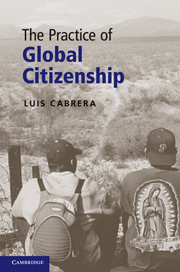Book contents
- Frontmatter
- Contents
- Preface
- Acknowledgments
- Introduction
- Part I Theoretical concerns
- 1 Global citizenship as individual cosmopolitanism
- 2 Rights, duties, and global institutions
- 3 Defining and distributing duties
- Part II Global citizenship in practice
- Part III Advocacy and institutions
- Conclusion: the practice of global citizenship
- Appendix
- Works cited
- Index
2 - Rights, duties, and global institutions
Published online by Cambridge University Press: 05 June 2012
- Frontmatter
- Contents
- Preface
- Acknowledgments
- Introduction
- Part I Theoretical concerns
- 1 Global citizenship as individual cosmopolitanism
- 2 Rights, duties, and global institutions
- 3 Defining and distributing duties
- Part II Global citizenship in practice
- Part III Advocacy and institutions
- Conclusion: the practice of global citizenship
- Appendix
- Works cited
- Index
Summary
The previous chapter was primarily concerned with the appropriate fit of a conception of global citizenship within the category of individual cosmopolitanism. Cosmopolitanism was thus outlined, but the individual rights which inform most cosmopolitan accounts were left mostly unspecified. Thus it will be useful to begin here by detailing a conception of human rights that will plausibly arise from an emphasis on human moral equality. That will lay the groundwork for the discussion of corresponding natural duties, of obstacles in the way of securing human rights in the current global system, and why some forms of institutional transformation and creation are recommended.
A human right can be understood as a type of justified claim made on others within a context of moral equality. It is not an absolute claim, and it is not viewed as inalienable. Rather, a human right is a claim corresponding to a human interest vital enough that it deserves special protection and obligates others to help provide that protection. Vital interests would include those in not dying prematurely, not being subjected to unchosen physical harm; having adequate nourishment, shelter, and access to medical care, being able to exercise agency, and not facing unjust discrimination (Buchanan 2004, 25–6, 134–5; see Raz 1986, 166; Shue 1996; Jones 1999, 61–2; Caney 2005, 72–7; 2007a). Such interests are so essential to human well-being, or to the leading of what can be characterized as a decent human life, that they give rise to specific protective rights. Thus it is not the rights themselves, but a conception of vital interests common to all persons that provides the foundation for the approach to individual duties developed here.
- Type
- Chapter
- Information
- The Practice of Global Citizenship , pp. 34 - 65Publisher: Cambridge University PressPrint publication year: 2010

